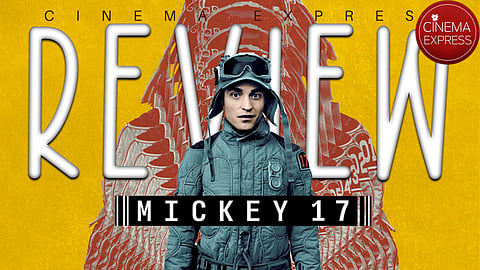Overt, layered, entertaining commentary on de-humanisation
Mickey 17(4 / 5)
A desperate man is cloned, sent to an off-world colony to do dangerous jobs, dies, gets cloned again, and the cycle repeats. The hopelessly meek seventeenth iteration of Mickey Barnes says "Thank you" when his half-conscious body is carelessly shoved inside molten fire to be recycled. After being unwittingly subjected to a cruel experiment involving a poisonous substance slipped through food, Mickey somehow survives and thanks his boss for the dinner. Exploitation of the working class, the absurd extents of capitalist greed, the psychology of voluntary subservience, the technological resurrection of slavery and discrimination, how love somehow makes all of this bearable. The themes, the intricate confluence of layers, the relevant socio-political commentary, it is all glaringly unmissable. While this only adds to its merits, Mickey 17 has a lot more to offer than just surface-level satire on capitalism.
Director: Bong Joon-ho
Cast: Robert Pattinson, Naomi Ackie, Steven Yeun, Toni Collette, Mark Ruffalo
Robert Pattinson as Mickey Barnes exhibits phenomenal range. He disappears into the role, and through subtle tweaks in dialogue delivery and body language, the distinct personalities of Mickey 17 and Mickey 18 come through with impressive contrast. Mickey 17's misguided guilt (as a result of a childhood accident which kills his mother), evolves into self-loathing, which is then exploited by the capitalised machinery. If not for anything, Mickey 17 excels in laying bare the societal machinations that work to make a slave out of a person by exploiting their psychological weakness borne of self-reproach. Mark Ruffalo's Kenneth Marshall, the leader-politician of the off-world colony, seems to be a direct amalgamation of the Donald Trumps and Elon Musks of the world, a wildly relevant and interesting character archetype. While humanity has been focusing on the separation of church and state in the last century, Marshall represents the fairly recent chimera of techno-capitalism and ideologically-gripped government machinery, leading to neo-monarchy. Marshall's cult-like fanbase, including his corporate logo, overtly parallels Nazism.
While Mickey 17 is a direct satire on capitalism and its dehumanisation of the working class, the film shines through by showing us how the system is stacked in a way that makes it easy for the powerful to dehumanise the powerless and for themselves to internalise it. At several moments, Mickey is harassed and bullied for being 'soulless'. The nature of the soul and what it takes to be a human becomes a central theme towards the end. Bong Joon-ho takes an interesting approach by adding an alien life form, on top of Mickey, to elucidate his point on humanity. A crucial character sacrifices themselves and is finally seen as 'human' in the eyes of Marshall; Mickey realises the alien life-form was bluffing to protect its kind, and Mickey 17 himself, comes out of a nightmare unscarred. All of these poignant moments are connected through how all of these characters transcend to become 'humans' by overcoming their fears. It is not achieved through daring superhuman feats of power but simply by acknowledging their fear and surpassing it. Perhaps a soul is simply the ability to acknowledge fear, to fear death; and to be human is to still have the courage to sacrifice, to protect your loved ones, and to respect yourself.
Perhaps Bong Joon-Ho is reiterating his commentary on capitalism and dehumanisation from his previous films, like Mickey Barnes who gets repeatedly cloned. However, much like how Marshall realises at the end that even clones have souls, and unlike vapid franchise films that serve as nothing more than cash grabs, Joon-Ho's clones have souls and are worthy of love.

